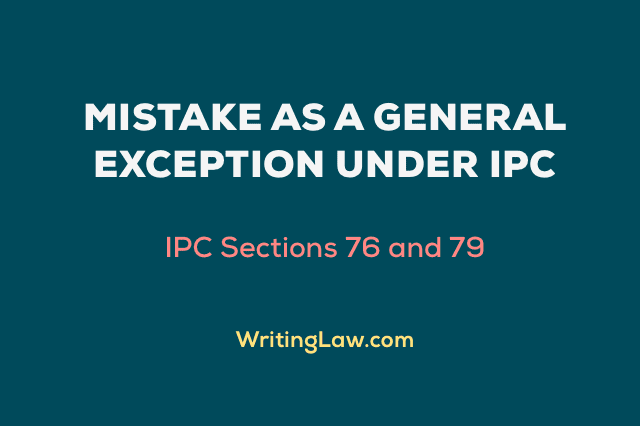
Mistake as a general exception can be understood by two sections of the Indian Penal Code, 1860. They are section 76 and section 79. The brief discussion about this topic is given below. Let us take a look.
Section 76: Act done by a person bound, or by mistake of fact believing himself bound, by law.
Nothing is an offence which is done by a person who is, or who by reason of a mistake of fact and not by reason of a mistake of law, in good faith believes himself to be, bound by law to do it.
Illustration: ‘A’, a soldier fires on a crowd by order of his superior officer, following the commands of the law. Here, no offence has been committed by A.
Ignorantia facti excusat, ignorantia legis neminem excusat
Section 76 of IPC is established from a well-known maxim, ignorantia facti excusat, ignorantia legis neminem excusat. It means that ignorance of fact is an excuse, but ignorance of the law is not an excuse. The mistake of fact to be an excuse must be a mistake related to a material fact that is necessary to constitute a particular offence. Mistake must be reasonable and acceptable and that it is not a mistake of law but a mistake of fact.
One can not plead the defence of mistake of fact if the act committed is illegal. Further, no one is permitted to plead for this defence if the responsible investigation reveals the correct facts. Mistake of fact is also not accepted as a plea when the act is punished by law without reference to the mind of the wrong-doer.
Case Laws:
1. R vs Tolson (1889)
2. Bhawoo Jivaji vs Mulli Dayal (1888)
Belief in good faith
A certain mistake of fact is not enough. Not every mistake renders a defence. To plead for the mistake of fact as a defence, it must be reasonable and must have been made in a bona fide belief or good faith.
Case Law:
1. Sheo Surun Sahai vs Mohomed Fazell Khan (1868): Acts that are done in moments of confusion is also preserved under section 76 of the IPC.
2. Chirangi vs State (1952)
Essentials elements of section 76 IPC
The essential elements of section 76 can be assessed as follows:
- An act or mistake done by a person who is compelled by law in doing that.
- Such a person believes that he is bound by law to do such an act.
- Mistake must be related to fact and not the law.
- The act committed must be in good faith.
Section 79: Act done by a person justified or by mistake of fact believing himself justified by law
Nothing is an offence which is done by any person who is justified by law, or who by reason of a mistake of fact and not by a reason of a mistake of law in good faith, believes himself to be justified by law, in doing it.
Illustration: A was being tried for stealing the umbrella belonging to B. A has pleaded that he was intoxicated at the time of taking the umbrella and mistakenly believed that the umbrella was his own. The defence is justifiable because A mistook another’s umbrella to be his own in good faith.
Section 79 of IPC provides a defence to a person who commits an offence and, because of a mistake of fact and not a mistake of law, believes himself to be justified by the law in doing it.
Case Laws:
1. Kesho Sahu vs Saligram Shah (1977)
2. State of Orissa vs Bhagaban Barik (1987)
Essential elements of section 79 IPC
The essential elements or ingredients of section 79 are as follows:
- An act committed by a person under a mistake of fact.
- Such a mistake must be a mistake of fact and not of law.
- The mistake must be made with bona fide belief or in good faith.
- The person doing the act is either justified by law or he believes to be justified by the law in doing such act.
Difference between section 76 and section 79 IPC
Section 76 deals with cases where the person under a mistake considers himself to be compelled or bound by law to act in a particular way. Although his act is a crime on the actual condition of the facts.
On the contrary, section 79 deals with cases where a person under the mistake considers himself to be simply justified or excused by the law to act in a particular way.
In short, section 76 contains legal compulsion whereas, section 79 contains legal justification.
- Understanding the Legislative Branch of the Indian Government - 6th May 2024
- Appointment, Oath, and Removal of Constitutional Posts in India - 28th April 2024
- Powers of Income Tax Authorities in India - 26th April 2024







